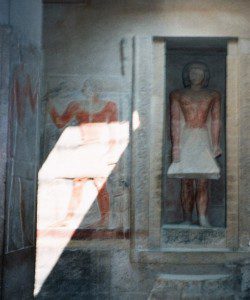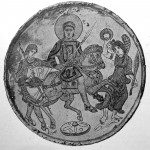
Ancient Christians will tell us, however wrong and faulty their faiths might have been, pagans were right to be concerned about religion. It is a key to the human condition. The problem is not religion, as some in recent times have suggested, but following religious rites without the complement of wisdom. For without wisdom, religion can easily be abused. Wisdom helps counter simple fideism; it helps prevent religion turning into a thing of inspiration to legalism which hinders the good which should flow from such devotion.
It is possible to find ancient religions had various rays of truth inspiring them which led to their establishment, which is why they could and did do some good for the societies they were in. But, Christians would argue, no pre-Christian religion possessed the fullness of divine revelation, and much of what was good in other faiths often was filtered out by the societies in which they developed, so the good intended by them was hindered by the practitioners themselves. And so it was possible to see in other faiths partial revelations of the truth which needed to give way to the revelation provided in Jesus Christ, imitating the humility of St. John the Baptist.
In this manner, we can understand Lactantius when he said what was needed for society and found in the Christian faith was the combination of religion with its rites and the desire and love of the truth pursued by many ancient philosophers:
It is agreed upon, therefore, by the general consent of all mankind, that religion ought to be undertaken; but we have to explain what errors are committed on this subject. God willed this to be the nature of man, that he should be desirous and eager for two things, religion and wisdom. But men are mistaken in this, that they either undertake religion and pay no attention to wisdom, or they devote themselves to wisdom alone, and pay no attention to religion, though the one cannot be true without the other. The consequence is, that they fall into a multiplicity of religions, but false ones, because they have left wisdom, which could have taught them that there cannot be many gods; or they devote themselves to wisdom, but a false wisdom, because they have paid no attention to the religion of the Supreme God, who might have instructed them to the knowledge of the truth.[1]
Christianity is meant to be a religion with practices and rites which connect us to God with mysteries which open us up to the grace which enlightens us, so that we have both the rituals and the wisdom together. The rites, even if new, at least demonstrate the value and truth of religion, that pre-Christians were right to seek out some form of worship for themselves. But God wants to transforms us on the inside, and religious rites should be used for such interior transformation. Our rites, therefore, are not physical sacrifices like those found in other religions, because God had no need of them as Athenagoras expressed:
And first, as to our not sacrificing: the Framer and Father of this universe does not need blood, nor the odour of burnt-offerings, nor the fragrance of flowers and incense, forasmuch as He is Himself perfect fragrance, needing nothing either within or without; but the noblest sacrifice to Him is for us to know who stretched out and vaulted the heavens, and fixed the earth in its place like a centre, who gathered the water into seas and divided the light from the darkness, who adorned the sky with stars and made the earth to bring forth seed of every kind, who made animals and fashioned man.[2]
Recognizing that we need to give ourselves and all we have to God, various religious rites (in a way) make sense, but they falter when they only give what is external to ourselves over to God. The true sacrifice is a heart open to God, a heart of praise. This need to give ourselves to God is intuitive and a foundation for many religious practices, which is why religion is a good, but when it is without wisdom and guidance from above, then alas, it becomes at best a simulacra of true religion and fails to obtain the rewards sought after. And yet, because truth is lost to such religious rites, it is understandable why so many who seek it, such as the philosophers of old, tended to have little actual engagement with religion that they were often were misconstrued as atheists. These same philosophers understood that the change in religious rites, the novelties found in religions, continued throughout time , and so became cynical in regards to religion. But because of such disregard for religion, they did not open themselves up to the graces they needed for enlightenment, making their wisdom, while good and invaluable, quite fallible.
The best among the philosophers were believed to be Plato and Socrates. Not only did they continue, in part, to follow the religious rites (however questionable they were), they also understood they did not comprehend the truth, that it was greater than they could ever know, and this served as the foundation of their engagement with it. This is one of the reasons why St. Clement of Alexandria suggested that Christians should not entirely disregard Plato:
I seek after God, not the works of God. Whom shall I take as a helper in my inquiry? We do not, if you have no objection, wholly disown Plato. How, then, is God to be searched out, O Plato? “For both to find the Father and Maker of this universe is a work of difficulty; and having found Him, to declare Him fully, is impossible.”[3]
What we seek is the truth. We are meant to worship God, and therefore to follow him in religion, but the worship should be in spirit and in truth. The truth comes not from us but is, at best, discerned by us from its self-disclosing revelation. Worship is necessary to open us up to the truth, for it reveal the humility we need in order to search for the truth, indicating our acceptance that we cannot do all things ourselves. Worship seeks to silence all our thoughts which would distract us from the experience of the truth, so we can become hearers of the word or seers of the light of truth. Indeed, many Christians believed that the ancients, because of their rites, were not entirely closed off from the truth. It was accepted that some of their prophets, like the Sibyls, were able to prepare the world for Christ:
Let the Sibyl prophetess, then, be the first to sing to us the song of salvation:—
“So He is all sure and unerring:
Come, follow no longer darkness and gloom;
See, the sun’s sweet-glancing light shines gloriously.
Know, and lay up wisdom in your hearts:
There is one God, who sends rains, and winds, and earthquakes,
Thunderbolts, famines, plagues, and dismal sorrows,
And snows and ice. But why detail particulars?
He reigns over heaven, He rules earth,
He truly is;”—where, in remarkable accordance with inspiration she compares delusion to darkness, and the knowledge of God to the sun and light, and subjecting both to comparison, shows the choice we ought to make. For falsehood is not dissipated by the bare presentation of the truth, but by the practical improvement of the truth it is ejected and put to flight.[4]
We must engage the truth wherever it is found and accept it and follow it, not just in thought (wisdom) but in deed (religious rites). If some element of truth is disclosed or examined by non-Christians, we should praise God for it. What is at the core of humanity is the need to unite with God. Religious rites open us up for God, making us ready for such union. It is up to God to respond, and when he does, religion becomes taken up by God and affirmed by him. If he does so, who are we to deny it?
[1] Lactantius, The Divine Institutes in ANF(7): 78.
[2] Athenagoras, “A Plea for the Christians” in ANF(2)134-5.
[3] St. Clement of Alexandria, “Exhortation to the Heathen” in ANF(2):191.
[4] St. Clement of Alexandria, “Exhortation to the Heathen,”194.
Stay in touch! Like A Little Bit of Nothing on Facebook:
A Little Bit of Nothing













